#the japanese condition….
Text


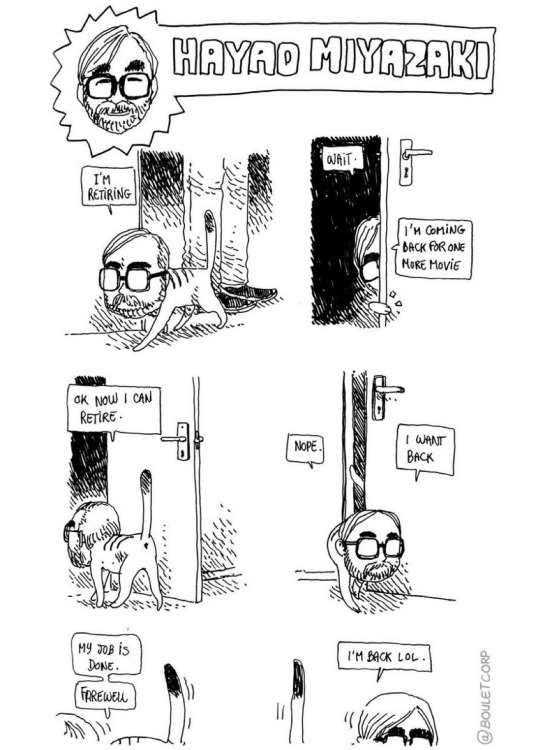

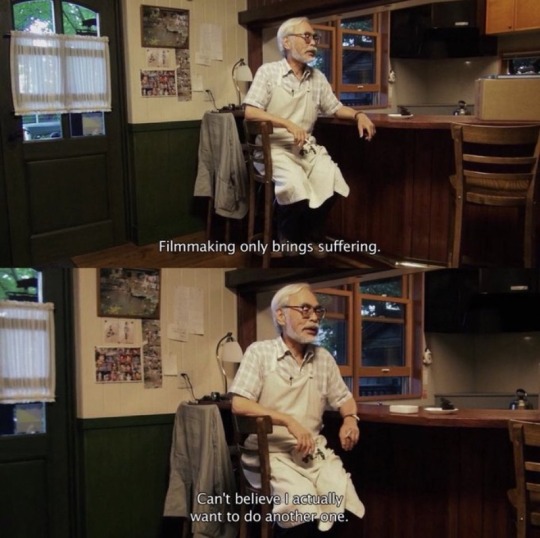
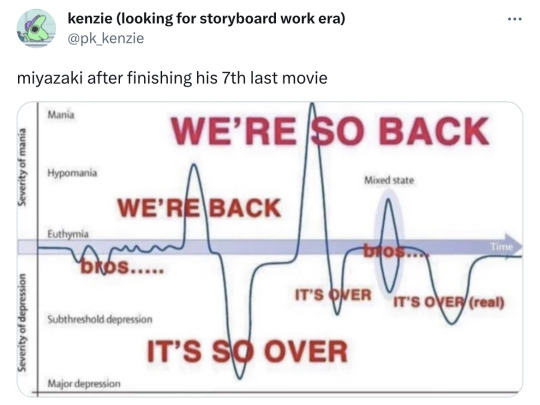
his best running gag
#he’s just like me fr though……#the japanese condition….#the comic is by french artist bouletcorp and linked in the source#hayao miyazaki#the boy and the heron#studio ghibli#twitter#anime
23K notes
·
View notes
Text



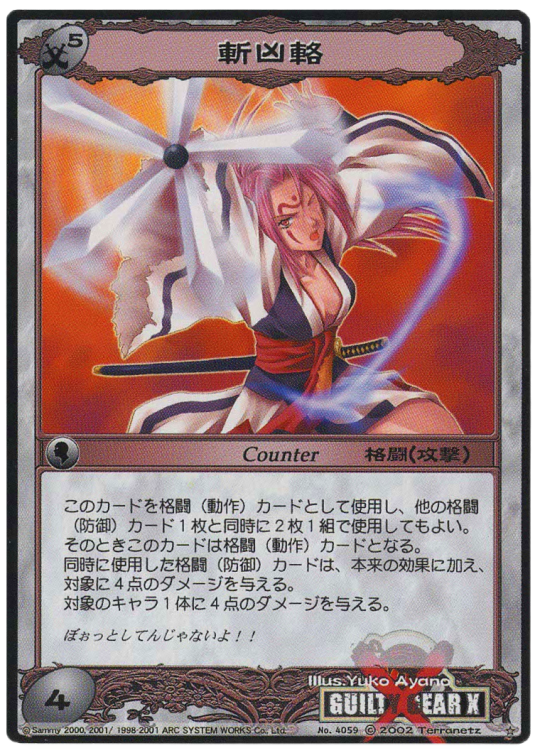

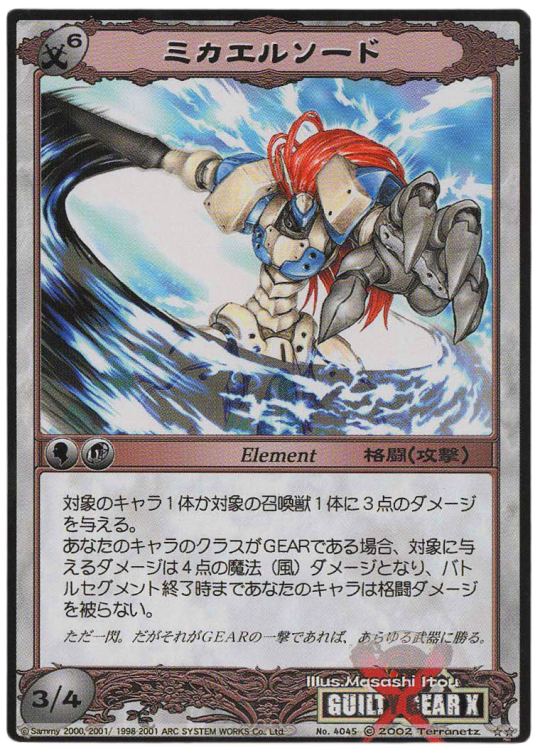
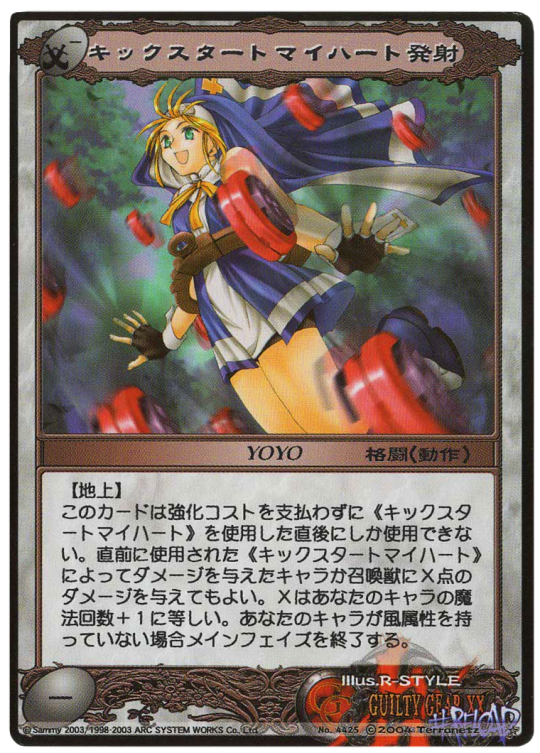
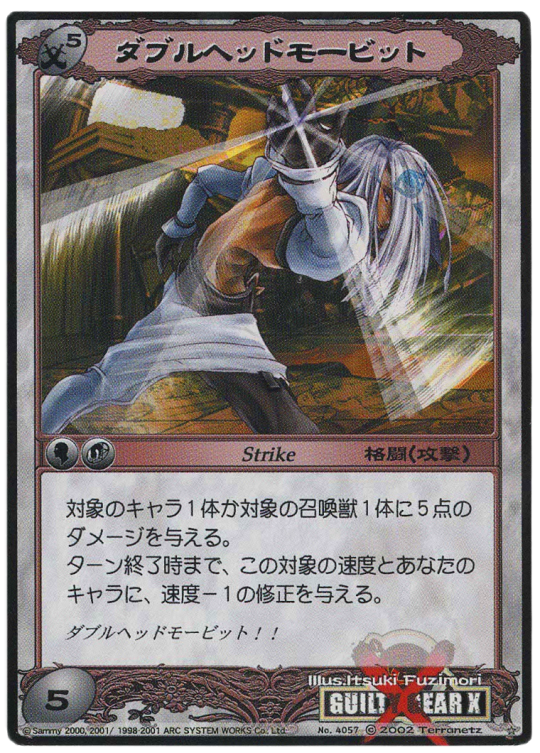
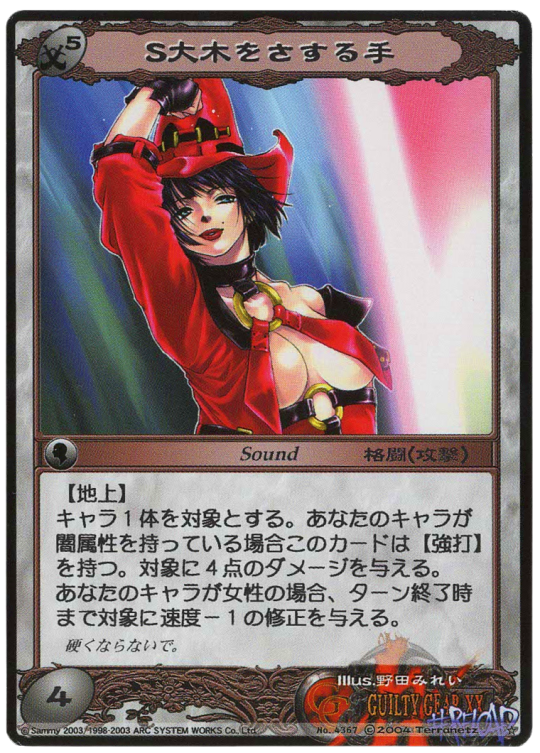
Hi do you like images. I love images. Heres a little over 100 guilty gear trading cards from the early 2000s. Every character up to xx is accounted for… some more than others. For now. But the average is probably 4 or 5 cards per character. Nearly all of the art is original. Okay have fun :)
#i hope anyone thinks this is as neat as i do.#oh yeah! also scanned the booklet. a little messy but its fine. so theoretically you could learn how to play. if you can read japanese#i tried not to let my perfectionism consume me too much with this. but know if anything looks off hmm 90% chance its the card's fault.#some arent in the best condition and the printing isnt the best to begin with on some of em. but i tried to pick out the best when i could#theres only 1 zappa and robo-ky. very sorry.#complete coincidence that testament has the most cards… well tied with dizzy. and they arent even on 2 of them so dizzy wins actually.#ill probably keep lookin for more cards but i should ummm. pace myself. smile.#the kat goes meow#guilty gear#gg#show up in the main tag... please
740 notes
·
View notes
Text
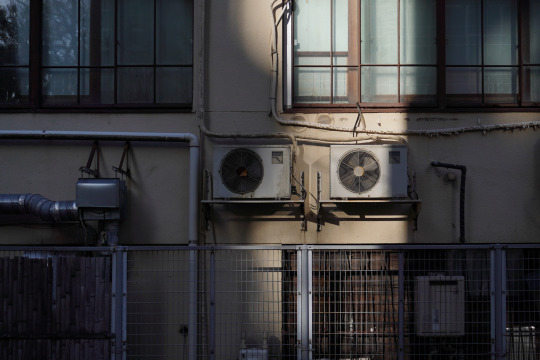
#architecture#japan#street#building#street photography#urban photography#urban#city#tokyo#urban landscape#facade#light#patchwork#air conditioning#shadow#japanese#streets#streetscape#street scene#city streets#streetshot#cityscape#buildings#skyscrapers#東京#日本#retro aesthetic#retro#retro style#vintage
21 notes
·
View notes
Text
once again a portrait of me after watching f1

#how is a girl supposed to fall asleep under these conditions#these conditions being pissed about a crappy team and sport revolving around rich men driving cars#2025 can’t come soon enough#japanese gp 2024#roscoehamiltons.txt
10 notes
·
View notes
Photo





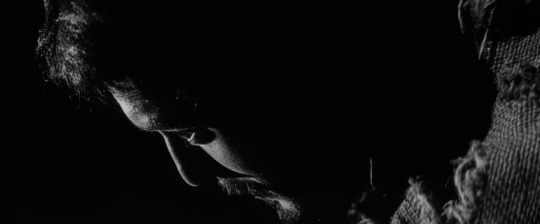

“The Human Condition” (1959-1961) by Masaki Kobayashi
#the human condition#masaki kobayashi#film#cinema#movie#movie stills#film frames#cinematography#cinephile#japanese film#japan film
101 notes
·
View notes
Text
i wanna show gavi my pokemon card collection so bad. i feel like he would pretend to be interested even if he is,,, not interested at all.
#my collection is EXPANSIVE so it would be a several hour endeavor#hes gonna look at my mint condition japanese stoutland n HE IS GONNA LIKE IT#gavi#pablo gavi#pablo martín páez gavira#fcb#barcelona#fc barcelona#spain nt#pokemon
9 notes
·
View notes
Text

YOUR 2022 F1 WORLD CHAMPION, MAX VERSTAPPEN!!!
#max verstappen#capless max#f1#formula 1#japanese grand prix 2022#I DONT CARE I POST IT AGAIN BCS THE PICTURE IS RELATABLE IN EITHER CONDITION
136 notes
·
View notes
Text
ok im starting to read the goblin emperor in japanese, and im doing it slowly because i want to compare the japanese tl to the english original as i go. this line stuck out to me:
乞食の子同然のていたらくに育っていないかと調べにきた使者との対面は、べつにこれが初めてではない。
“It would not be the first time one of his father’s messengers had witnessed him as unkempt as a half-witted ragpicker’s child…
the phrasing 調べにきた is interesting to me for how it reflects on varenechibel iv's character. it's implying that checking in on maia's condition is the reason that messengers might come to edonomee. but the original english doesn't contain that meaning at all, i think
#i read the english as varenechibel doesnt care about maias living condition at all#and the japanese as thats a thing he sends messengers to check up on sometimes even if he doesnt really care in the end#said el#el reads the goblin emperor#the goblin emperor
10 notes
·
View notes
Text
First Read of 2023 | New Shop Addition
I'm back! I've officially finished my first Japanese read of 2023: 花野井くんと恋の病 (A Condition Called Love) and I'm quite pleased with myself--it only took me 10 days.
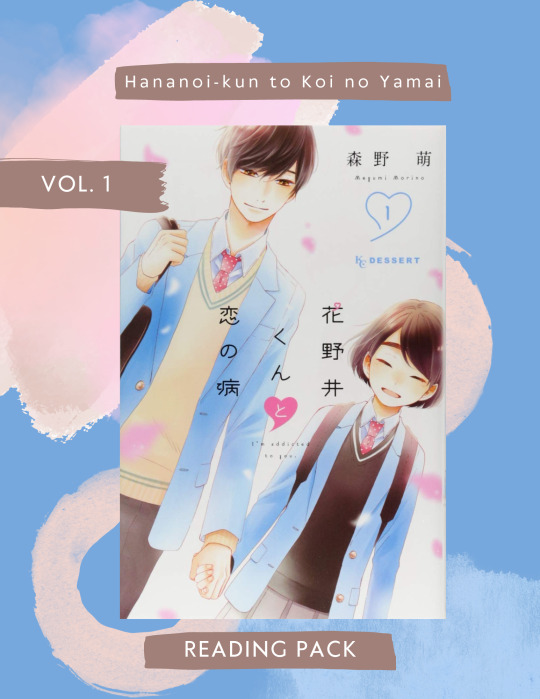
☁︎ I opted to use this series to kick off the new READING PACKS section that I have added to my shop. There's no need to feel daunted when you're trying to read a series or trying to read your first book/manga in Japanese. These reading packs go line-by-line, word-by-word, with the goal of helping beginners read with ease. The goal of the Kingyo Hut shop is to make the unachievable achievable.
☁︎ Each reading pack will include a searchable PDF, as well as an Excel sheet (divided/sectioned by chapters) that you can convert to .csv files to import into Anki or any other SRS study tool that you may use.
☁︎ For this particular pack, there are over 1,000 entries, going line-by-line, word-by-word (in order). Each entry has: page number, kanji, kana, definition, and notes (if necessary). There are also grammar points notated in the files in the "notes" section. Keep an eye out for the next books in the series, too. There are at least 11 more 😉!
☁︎ What makes this different from a regular vocab list or the vocab lists that I sometimes share on my blog? These reading packs are made with beginners in mind, meaning that every. single. word. is on there in some way or another (yes, that means 私, どこ, あんな, この, 友だち and other words that many of us consider to be basics are included on there). This helps you start the journey and feel less daunted. No need to feel stupid when you look up a word--we all have to at some point or another.
☁︎ Currently, I'm using the series that I'm personally interested in reading, but if there's a series/book that you think you'd like to see a reading pack for, send me a message (on here, my studygram, or discord) or an ask (you can be anonymous if you want) and let me know! I can't guarantee that I can do every request (i.e., time, series/genres I may not be comfortable with, etc.), but I will definitely make an effort!
If you're interested, grab one now while they're at the low price of $9 USD.
#japanese#heydilli#look asta#look toki#kingyo hut#my shop#kofi shop#jpnstudynet#study japanese#japanese grammar#learn through reading#learn through immersion#bookblr#studyblr#langblr#nihongo#vocab#kanji#hananoi kun to koi no yamai#a condition called love#manga#shoujo#shoujo manga#reading in japanese#small business#book club#japanese books#polyglot#languages#japanese language
59 notes
·
View notes
Text
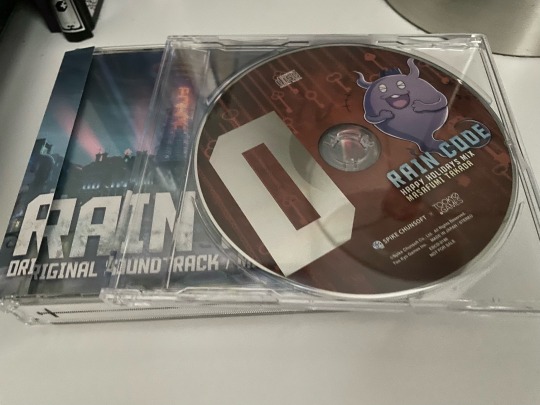
Ahhhhh, my CDs finally came home!
#master detective archives: rain code#rain code#rain code merch#I’ve only listened to the Happy Holidays Mix CD so far and there’s good remixed tracks in it#it’s actually one long track with transitions to each new song#some of the picks pleasantly surprised me too and the last one was really amusing#I’m going to listen to the other discs later#I also really like the jewel case and the design of the CDs#the booklet was neat but I don’t know Japanese to translate the interview#the best part was that the case came in perfect condition
10 notes
·
View notes
Text
14.4) Conditional Forms (と)
The last conditional form we will talk about is the conditional と particle. First though, it’s important to distinguish between this usage and other usages of the と particle. Just like に and で, there are many ways you will see/hear the conditional と used!
Below are 6 sentences that use the と particle, but NOT the conditional と.
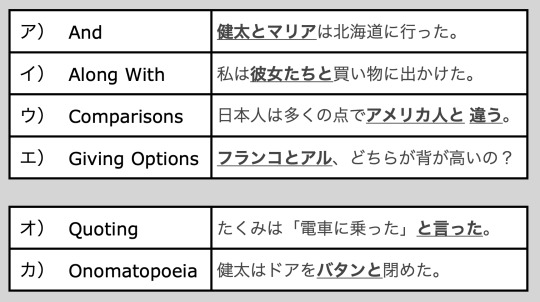
If you want to read about these uses, check out these posts I made about them:
【Examples ア-エ】
【Examples オ and カ】
Also, I already wrote a post about the conditional と particle that you can read here. In this post I’m going to be looking at conditional と in a different way. Here is your vocabulary:
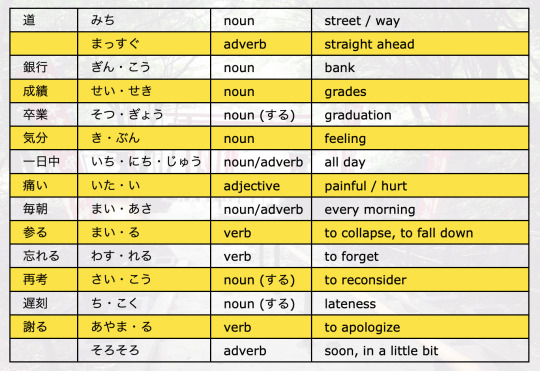
【The Grammar of と】
The conditional と particle can attach to verbs, adjectives and noun-copula pairs (but only in the form of noun+だ).

【Did It Happen Or Not?】
When you look at sentences with the conditional と, there are two possibilities when it comes to the second clause:

If we think of this with English counterparts, here are two examples:
[Case1] When / If water reaches 100℃, it boils.
[Case2] When I walked in the room, the students stopped talking.
In case 1, the event in the first clause (water reaching 100℃) inevitably leads to the event in the second clause (it boiling). That is to say, the second clause hasn’t actually happened yet... but if the first clause happens, it will.
Compare that to case 2, where both events have already happened. This is a big difference between the two cases. Now, here are some Japanese examples:
①{この道をまっすぐ行くと}、{銀行があります}。
= when/if the/this street go straight, there will be a bank
= When/if you go straight down this street, there will be a bank.
②{成績が悪いと}、{学校を卒業できないよ}。
= when/if grades are bad, can’t graduate from school, you know
= When/if your grades are bad, you can’t graduate.
③{学校に行くと}{休みだった}。
= when go to school, it was rest
= When I went to school, it was closed.
【The Timing of と】
Another thing to think about when using the conditional と is the timing of the events. と gives the nuance that both happen almost at the same time.
④{天気がいいと}{気分がいい}。
= when/if the weather is good, feel good
= I feel good when/if the weather is good.
Example 4 is saying that the weather being good directly leads to the speaker also feeling good. The nuance of the timing is that as soon as or soon after the weather is good, the speaker feels good. Sometimes, this means that you can translate the と as “once”.
We will come back to this idea of timing when we compare the conditional forms. 😉
【When or If?】
In general, if the second clause is in past form, the English translation will use “when”.
Here are two more examples:
⑤ 一日中{パソコンを使うと}、{目が痛くなります}。
= all day when/if use a computer, eyes hurt
= When / If I use the computer all day, my eyes hurt.
⑥ 毎朝{起きると}{コーヒーを飲む}。
= every day when wake up, drink coffee
= Every day when I wake up, I drink coffee.
For example 5, there won’t be a difference if you think of the と as “if” or as “when”. However, there is a HUGE difference between “when I wake up” and “if I wake up”! This shows that the action or adjective in the first clause is the key to the English translation. Some words will naturally translate to “if”, and some words will naturally translate to “when”. Many words though, can use either and make sense.
【〜ないと】
The last thing we should talk about is the “warning” usage of conditional と. Because the conditional と expresses a natural consequence or an inevitability, it is often attached to the negative form of a verb in order to warn the listener of some... negative consequence. An extension of this is indicating the speaker’s responsibility or duty to do something.
There are three kinds of clauses you will see / hear after a ないと clause: (1) a grammatically positive phrase with a negative meaning or (2) a grammatically negative phrase with a negative meaning. Here are some examples:
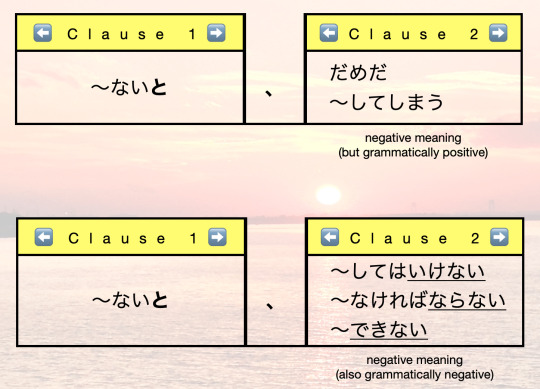
だめ simply means “it’s not good”.
〜してしまう has a nuance of something unexpected happening. For example if you use the verb 参る with しまう, you get 参ってしまう which means “unexpectedly collapse or fall down”.
〜してはいけない is a roundabout way of saying “don’t do 〜”. For example if you use the verb 忘れる in this construction you get 忘れてはいけない. This basically means “don’t forget”.
〜なければならない means “have to do 〜”. If you use the word 再考する in this construction, you will get 再考しなければならない。This means “have to reconsider”.
Finally, 〜できない means “can’t do 〜”
Here are some examples with Japanese sentences:
⑦{早く起きないと}{遅刻するよ}。
= in an early way, if don’t get up, will do lateness
= If I don’t get up early, I’ll be late!
⑧{アンに謝らないと}{いけない}。
= to Ann, if I don’t apologize, it won’t go/do
= I have to apologize to Ann.
Notice how clause 2 in example 7 is grammatically positive (遅刻する) but has a negative meaning. On the other hand, clause 2 in example 8 is negative (いけない) and also has a negative meaning. This is something you will see quite often after a ないと phrase.
The third possibility for what comes after a ないと clause is... nothing! Japanese often avoids being direct by simply not saying a phrase or a word. With ないと clauses, everyone knows that the following clause is something negative so it’s ok to just not say anything. The listener or reader can use their imagination to figure out the negative consequence(s). Here is an example:
⑨{そろそろ寝ないと}。
= well... soon if don’t sleep...
= Well... I need to sleep soon.
First off, we don’t actually know who the subject is in example 9 but we can assume that it is the speaker though. The speaker intentionally leaves off the second clause. We don’t actually know what will happen if he/she doesn’t sleep but because of the ないと, we know it won’t be good!
【Conclusion】
And that is what you should know about using the conditional と. I hope this post was helpful and informative. As always, if you have any questions, let me know!
The next post will be the last one in this conditional forms section, so look out for that. Good luck with your Japanese learning adventure!
Rice & Peace,
– AL (アル)
👋🏾
#japanese#japanese grammar#learn japanese#japanese language#japanese lesson#japanese study#japanese vocabulary#japanese vocab#japanese verbs#studying Japanese#japanese particles#japaneselessons#japanese langblr#learnjapanese#japanese studyblr#japanese conjunctions#japanese conditionals#language#languages#language study#language studyblr#language blr#日本語#日本語の勉強#一緒日本語#IsshoNihongo
154 notes
·
View notes
Text
I finally got to buy and read the new chapter so
Some thoughts (spoilers) ahead:
I really loved Morio's story and the significant it holds on many front that worth digging deeper into more :)
Can we get more Seiji and Madara interaction please ?? IT'S GOLD !!!
Seiji : haha Mr. Cat you were like a hero just now.
Madara : On the other hand, you're not acting like yourself trying to save a stranger.
Or
Madara : if you're not after the treasure then why are you wandering around like an idiot.
Seiji : how rude, despite what it looks like I'm still doing my job as Kuro Misa.
hmmm Seiji made it sound like he's searching for this dangerous tool so NOT to fall into the hand of the wrong people than to use it for himself ?? "Once you watched a lot of things unfold before your eyes you realize how troublesome the magic tools can be"
So Shinobu collecting magic tools for their sentimental value or what's inside them to watch those feelings crush before her eyes ?? Or am I understanding this wrongly ?? ..... Shinobu dear if that's true then that's pretty twisted that I don't know how to describe it :)
Shinobu doesn't want Clara to learn about what she did here .. Clara is a big fan of Kuro Misa ... hmmmm .. something is fishy here BUT THEN WE DIDN'T GET ANYTHINH NEW ABOUT CLARA ... STILL A BIG MYSTERY !!
waaait !!! Is the magic tool Seiji searching for the creepy 6 eyed mask that appeared in Natori's cousin arc ??? THE PLOT HAS THICKEN!!! Oooh ooooooooh !!!!! (Need to process this cuz alot of ideas is popping into my head right now like no other)
So, Seiji confirmed that even if someone join the Matoba clan and they aren't related by blood they would still suffer from the Matoba curse unlike what we saw in Morio case ...
So is Matoba clan the only exception to the rule ? Or is this depending on the yokai itself ? Hmmmm interesting info this bit ...
Tanuma's smile and happiness that he talked to a Yokai and speaking to Natsume about it full of joy is bringing tears into my eyes ... how can you tell him afterward that this yokai was evil in the end T^T
While I thought that Seiji protect the picture for his sister's sake it turned out he did it because his father adores this picture !!! Seiji really love his father and I'm feeling things right now T^T
Seiji stop with those hits that I never saw coming .. I just can't you idiot and my head is having ideas that ... aaaa
And wait ... that also kinda prove that his father loved his sister too .... oh ... ummmm ... wait .... >> lost in thoughts and pain ><
WAS THAT PICTURE REIKO ???? AND SHE WAS HAVING A GENTLE SMILE ON HER FACE !!!
WAAAAAIT !!!
How am I supposed to process this info ??? What does it mean ?? How did it come here ?? Is it one of Morio belonging ?? Or is it a picture by a famous artist ?? is Natsume's grandpa an artist ?? Since this an auction related to exorcist does that further proof that Reiko or Natsume's grandpa related to this world ?? WAIT I HAVE MANY QUESTIONS THAT NEED ANSWERING TO BE MIDORIKAWA-SENSEI !!!!! DON'T END THIS ARC LIKE THAT PLEASE !!!!
I read this chapter while I'm not in my best of condition so I might understand some things wrongly since I wasn't too focused while reading (must reread it) but what a read full of emotions and info to process .... what is Midorikawa-sensei cooking exactly ?? the plot has thicken indeed.
#natsume yuujinchou#natsuyuu#I must thank my brother who gave me the money to buy it since I never thought I would read it soon#I don't know why I read it while I wasn't in my best of condition but yeaaah#that's why I need to reread it#and why maybe I get some things wrongly .... those kanji was bad match for me#need to work on my japanese more ugh#now we're back to the long wait AGAIN#why isn't it monthly ... this is torture
11 notes
·
View notes
Text
On Jōnouchi's ADHD (1.39k words)
This headcanon is probably the longest on this blog; it's some compiled thoughts on how growing up with (undiagnosed) ADHD has affected Jōnouchi. It's halfway between headcanon and fanfiction piece, and was requested by @bloodyscott, whom I kept waiting for too long for a response. I apologise sincerely for the delay.
This headcanon begins below the cut, as it's obscenely long. You may find it more comfortable to read this from the blog page, or on Archive of Our Own (NOTE: tumblr is acting strange. To access the page, copy the link and manually remove the href.li portion and the second https), rather than on your dashboard/search, in terms of formatting and such.
From infancy, Jōnouchi wailed his way out of his crib, out of his room, out of his house—as a baby, he thrashed towards whatever freedom he could find. He loathed the four walls of the crib; he'd scarce room to move. A skin infection brought him, aged 4, to hospital, and the very sight of overrun grey plastic seats and skinny cubicles exhausted him more than his illness had ever threatened to.
In primary school, others’ desks would blend together in a whir. Here he was, stuck, dizzyingly sedentary—the longer he sat, the foggier the world seemed to grow. When he kicked and whined at other children throughout electric lunch breaks, and they shrank from his vitality, he learned to eat alone. As his peers trudged from class in packs, watching the pavement, he sat, sullen, as his father drove him home. Somehow, Katsuhiro had never trusted him not to lose himself in chasing his surrounds. The fabric of the car seat would bite into his shorts, and he’d squirm for the window, squealing towards the noise outside: Birds that cawed; scraps of paper that fluttered and choked on smog. That was a fragile era, when his mother still waited, with dry hands and chipped nails, at home. When his father already stank of beer, but still spoke loudly, deeply, boisterously. Again and again, Jōnouchi’s mother would sit her son down, and write his name, stroke by agonising stroke. She’d recite each mora in time with each character. Yet sound would cluster through his head, and his own name would dissolve amid his mother’s instructions, amid the blaze of sunlight trapped on the windowsill behind her. He would write, and the strokes would come out rushed, mis-ordered, lopsided.
Iro wa nioedo
chirinuru wo.
At 10, his father grew quiet, and his mother yet quieter. Silence took up like a plague in Jōnouchi’s head, and swarmed in shapeless formation throughout parched mathematics lessons. Times tables hurled themselves headlong into a skull full of fog, and burst on contact. Are you listening? a teacher asked. How could he listen with a head full of noise, of unspoken words billowing back and forth? He gripped his seat, and glared back. Why should I care, anyway?
When his mother left, his father stopped caring to chaperone him. It had taken Jōnouchi a decade to earn the right to shed his infancy. He resented that it had been this long, so tried to join the huddle of middle schoolers. He told odd stories, and took off, queasy, in front of them. They withdrew their smiles when he approached on the second day. He growled his plaint, and resentment drove him to take the opposite route. He explored back alleys, wallflower convenience stores and dilapidated cinemas; the faster he walked, the more clearly he could see each brick, and the brighter each fleck in the pavement glinted. At speed, he delayed the journey home, and set his eyes on a gorgeous early winter sunset. The colours bellowed, too bold for winter, ungainly and vain. They were glorious.
Jōnouchi came home late. His father glared; fog crashed back down on his shoulders.
Wa ga yo tare zo
tsune naran?
A week before she cleared out too few of Katsuhiro’s belongings and packed too few suitcases, Jōnouchi’s mother drove both children two miles to the optometrist. My son, she explained, reads slowly, yet resents reading; it seems he can’t see very well. My daughter’s sight seems clearer, yet she complains of pain. The optometrist forced Jōnouchi to read down a chart of letters; he fidgeted, and, consumed in memories of a lonely lunch break the day prior, passed with flying colours. When the optometrist flashed a light to photograph his eyes, whatever hideous miracle that was, Jōnouchi screamed.
Katsuya Jōnouchi, the optometrist surmised, had perfect acuity of sight. He sought attention, stimulation. Meanwhile, Shizuka Jōnouchi, who had sat entirely still throughout her examination, had more ragged, derelict peripheral vision than her family had anticipated. Untreated, both your children will get much worse.
And in the months after Shizuka Jōnouchi became Shizuka Kawai and Mrs. Jōnouchi became That Bitch Who Never Cared, Katsuya Jōnouchi became horribly aware of how little time he had to be lethargic. He had to survive this schism; yet as he was, he barely felt capable of thinking. He walked, fidgeted, paced to prove to himself that he was a moving, breathing organism. Yet his father’s frustration would brook no exuberance. Long before Katsuhiro fully committed to flinging glass and spurning his son’s misery, Jōnouchi began learning to move silently, slowly, around his father. He memorised which mats snapped and snagged, which bits of fabric hissed when stepped on. He noted which windows opened most quietly. And yet he never managed a perfect, quiet exit. He couldn’t help but be conspicuous; he could only hope to get out too quickly for his father to react. And, to lift the torpor that followed escape, he would run to school, and, after, run back. Never did the sun shine brighter than when he was moving.
Uwi no okuyama
kyou koete.
When he met Hirutani, did he become more violent? No; every punch he threw during his delinquency had waited, kinetic and desperate, for days, months, years. In classrooms, his sole responses to being ordered around had been sullen deference, with sullenness being his sole demonstration of rebellion. Now, threatened with the obsolescence of his ego, of his perceived freedom, he chained himself to violence, over and over. The first time he punched a man in the gut, he found himself shaking. And rather than sink into sallow, domestic remorse, he slathered himself in white rage. And he went back and he went back and he went back, helpless to his own instincts, trying to dredge the noise in his skull out through his fists. No matter how many punches he threw, and no matter how many he received, he could not stop his head from blazing anew the moment he walked away.
Did Duel Monsters afford him any peace? He would be no man’s losing dog; nor would he be confined to dull celebrity. To play as a strategist consigned him to sitting still, committing himself to gambits he could never entirely trust, to moves that demanded a clear head. To play too whimsically would doom him to inferiority. Thus, he gave half his heart to diligence, and half to sheer fortune. Nobody could idolise his kind of folly, nor devalue his kind of skill. This was Jōnouchi’s will—to eschew having to wait in the mire of expectation; to escape the fog of obligation to anyone’s morals but his own. Honour suited him, so long as it was on his meticulous terms. In games of Duel Monsters, he became a knight-errant of sorts: predictably unpredictable, unexpectedly canny, blindly faithful. With this relationship to his own fate laid out so, he could finally draw cards without fearing those next to come. And thus, hyperkinetic, he found a peace in the game. So he played and played until he forgot how long he’d been playing, and Duel Monsters became as second nature.
Asaki yume miji
ei mo suzu.
Two weeks before Jōnouchi’s graduation, Shizuka invited him to her place to dine. Their father was not to join them. Jōnouchi protested, and his desperation died in a pinprick throat. Wisteria spilled itself over the footpath. Each step threatened to plunge, vertiginous, to the ground.
When Jōnouchi saw his mother, his throat turned to sandpaper. She looked so old.
You cried so much as a baby, she told him. Kicked and screamed to see the world. You weren’t comfortable waiting in your crib—I’d end up coming to you at 4AM, walking you around the perimeter of the house till my heels burned. And you seemed so afraid of all the noises of the night—groaning engines, singing birds. Now, look at you—you’ve grown up so terribly fast.
Could he afford to tell her how even now, he bit down the urge to kick and scream, to launch himself, all fists and sparks, onto his tormentors? No; so, all night, he gripped his glass as tight as he could. The cold lingered and itched on his palms for days. Holding onto things, it seemed, was not so difficult as he’d once believed.
#couple of notes: i tried to write jōnouchi as also possibly having some form of conduct disorder that did not progress to aspd.#as i have neither conduct disorder nor aspd – i can't promise it's entirely accurate#and i apologise sincerely for any serious mistakes. i've tried to avoid stigma but i know i've a hell of a lot more learning to do#jōnouchi is meant to have combined-type adhd here. i have adhd but no diagnosed subtype#however i'd generally say i have an extremely different experience to jōnouchi here. (i'm either hyperactive or combined)#i've tried to stay away from stereotype while also focussing on how a young child might be both overtly and internally hyperactive#and how the display of symptoms might change with circumstance.#moreover; shizuka's eye condition in the anime is left vague and (probably unrealistically) curable#i went with some kind of glaucoma (probably open-angle but i really don't know enough to say).#she probably stopped losing vision after surgery but i doubt she actually got her peripheral vision back#the japanese poem interspersed throughout is the iroha. it was more significant to early drafts and i'm too sentimental to take it out.#i named jōnouchi's father katsuhiro (克弘) because calling him 'jōnouchi's father' got too cumbersome#i didn't really show jonouchi hyperfocussing much or write about his experience of time.#but since he's an esfp i probably need more time to work out how Se dominance could interact with time blindness#anyway. i'll shut up now.#yugioh#yu-gi-oh!#YGO#Yu-Gi-Oh#yu gi oh#katsuya jonouchi#katsuya jounouchi#jounouchi katsuya#jonouchi katsuya#shizuka jonouchi#shizuka jounouchi#jonouchi#城之内克也#tw domestic violence#cw domestic violence
11 notes
·
View notes
Text

Okay, but with all of the adults losing energy and motivation, we now have an airship full of people who approach their craft being hit with Bashou-level apathy.
(Gozu's taken his foot down, at least, compared to earlier.)
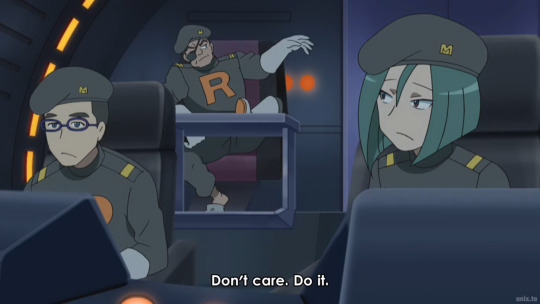
Wait, did he slide his other foot out of the boot, I didn't notice until just now, PFFT.

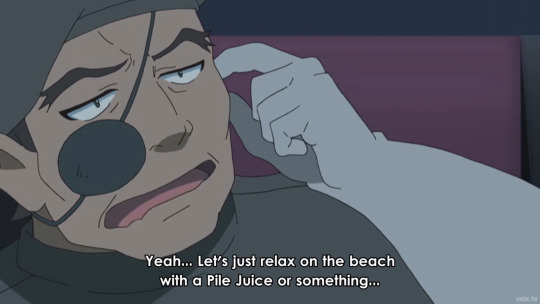
If they didn't get their motivation back by the end of this scene, we could've gotten a Matori-Matrix-at-the-beach scene, PFFT.
#Matori#Gozu#Team Rocket#PokeAni#PokeAni SuMo#we're hit..................#only Matori and Gozu are amusing and interesting but I think they're probably higher-ranking than the three up-front they're bossing around#do the three in front have names we know???#I'm still watching if we get them eventually okay!!#he's not missing an eye so I'm unsure of the eyepatch's purpose unless he wore it for the same reason I had to (... correcting a squint)#... or he just thinks it makes him look hardcore#... Gozu is the Japanese name of a guardian of Hell/the Underworld#I could buy that Gozu's just wearing it for the edginess BUT it could just also be a kinda underwhelming medical condition
11 notes
·
View notes
Text
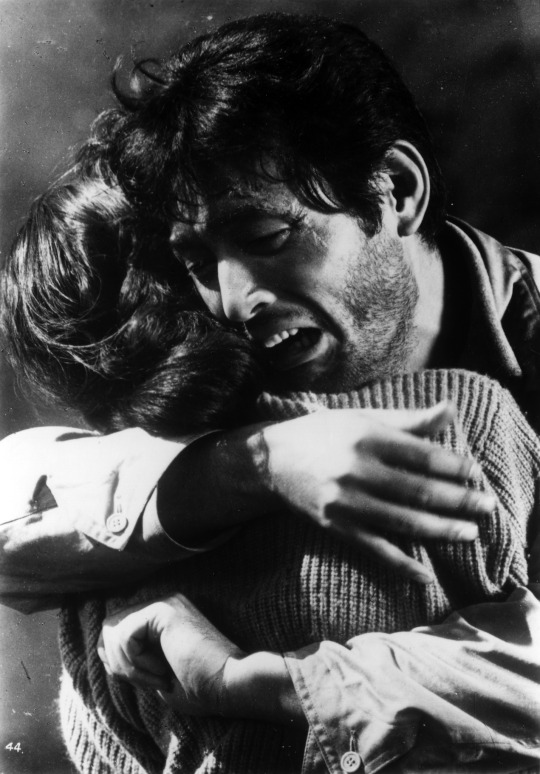
The Human Condition I: No Greater Love (第一部 純愛篇/第二部 激怒篇) — dir. Masaki Kobayashi, 1959.
#tatsuya nakadai#仲代達矢#michiyoaratama#新珠三千代#masaki kobayashi#小林 正樹#cinema#japanese cinema#vintage actors#vintage#classic films#the human condition#antiwar#photography#japan
31 notes
·
View notes
Note
can you tell me where you get jjba figures from?
Sure, I did this post forever ago but tl;dr, I usually use amiami for new figures, mandarake for pre-owned, fromjapan for specialty/auction, and I had a good experience buying from Big Bad Toy Store too, worth checking out if you're in the US and it's a larger item so the shipping might be less if you buy domestic.
#Anonymous#replies tag#figure talk#definitley check out pre-owned because Japanese collectors keep stuff in great condition and finding 'unopened' items is common#feel free to follow up if you need more specific advice
18 notes
·
View notes